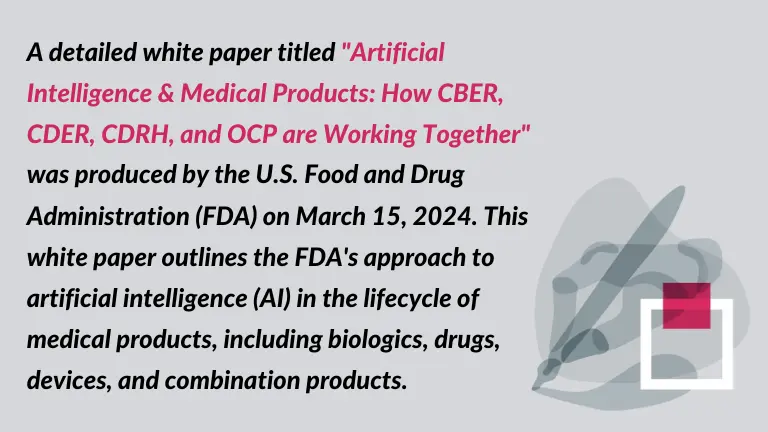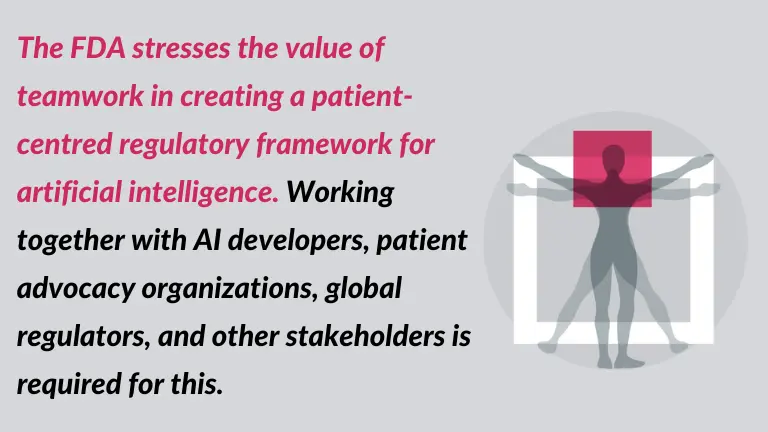FDA Artificial Intelligence White Paper: navigating the future of AI in medicine
The FDA (Food and Drug Administration) is an organisation whose activities directly affect people’s lives and health. Moreover, it regulates the US market for drugs, medical devices, and food. In our upcoming series of posts, we will take a detailed look at the Agency’s activities and procedures. We will also explore the issues it deals with. These topics may interest our readers. Let’s start addressing a crucial issue in the AI-based medical software development industry by examining the FDA Artificial Intelligence White Paper.
FDA: the mission
The Food and Drug Administration is responsible for protecting public health in the United States. What’s more, it ensures that pharmaceuticals for humans and animals, biological products, Software as a Medical Device and medical devices are safe, effective, and secure. The FDA also oversees the safety of our country’s food supply, cosmetics, and radiation-emitting products.
The agency works towards promoting public health by advancing technologies that improve the effectiveness, safety, and affordability of medical products. Additionally, it provides the general public with accurate, evidence-based information. People need this information to use foods and medical products to maintain and enhance their health.
FDA Artificial Intelligence White Paper
A detailed white paper titled “Artificial Intelligence & Medical Products: How CBER, CDER, CDRH, and OCP are Working Together” was produced by the U.S. Food and Drug Administration (FDA) on March 15, 2024. This white paper outlines the FDA’s approach to artificial intelligence in the lifecycle of medical products. Therefore, it covers biologics, drugs, devices, and combination products. It was jointly released by the FDA’s Center for Biologics Evaluation and Research (CBER), Center for Drug Evaluation and Research (CDER), Center for Devices and Radiological Health (CDRH), and Office of Combination Products (OCP). This is markedly a significant step in defining the future of AI in healthcare.

A response to Executive Order 14110
The AI White Paper was developed in response to Executive Order 14110, signed in October 2023 by the President of the USA. Most important is, that order instructed the Department of Health & Human Services to create a strategic plan for the ethical use of AI technology in the human services and health sectors. The FDA adopted the executive order’s definition of AI in its white paper. The white paper also highlights a risk-based regulatory structure intended for different types of medical goods.
Four key focus areas for regulating FDA Artificial Intelligence White Paper
The FDA’s white paper outlines four major focus areas for regulating AI in medical products:
- Promoting cooperation to preserve public health
- Advancing innovation
- Promoting harmonized standards and guidelines
- Supporting research on AI performance
Promoting cooperation to preserve public health
The FDA stresses the value of teamwork in creating a patient-centred regulatory framework for artificial intelligence. Working together with AI developers, patient advocacy organizations, global regulators, and other stakeholders is required for this. The organization intends to collaborate with other organizations to address niche issues like quality control and cybersecurity. To guarantee the responsible use of AI in medical products, the FDA also plans to launch training initiatives aimed at regulatory authorities, medical experts, patients, and business stakeholders.

Advancing innovation
To foster innovation in the artificial intelligence (AI) space, the FDA intends to improve the predictability and clarity of regulations. The agency hopes to accomplish this by monitoring developments in AI development and adjusting as needed to assess premarket regulatory filings promptly. Developing new techniques for evaluating AI algorithms is a major area of attention for this project, particularly in identifying and minimizing bias in the algorithms’ creation and training. The FDA’s participation in the Coalition for Health AI (CHAI) and other ongoing initiatives, such as the 2023 discussion paper on AI/ML in pharmacological and biological product development, are being expanded upon by this effort.
Promoting harmonized standards and guidelines
The white paper emphasizes the FDA’s commitment to advancing and enhancing AI best practices in medical product development. Expanding upon the current “Guiding Principles” for Good Machine Learning Practice (GMLP), which were created in collaboration with Health Canada and the Medicines and Healthcare Products Regulatory Agency (MHRA) in the UK, the FDA aims to guarantee the long-term safety and efficacy of AI-enabled products alongside addressing cybersecurity concerns. The organization also wants to create standards for ensuring data quality and the dependability of AI tools.
Supporting research on AI performance
The FDA’s final area of interest is funding studies on how AI may affect the efficacy and safety of medical devices. These projects will explore AI model bias and AI-related health disparities. They will also focus on continuous monitoring of AI tools to ensure they meet relevant standards.
Looking ahead
The AI White Paper lacks precise regulatory or policy details, instead outlining broad commitments and ideals. Rather, it signifies that the FDA plans to provide more information in the form of forthcoming draft and final guidance documents. Important to realize, that these publications will offer crucial information about what the FDA anticipates from premarket submissions. They will focus on AI-enabled or AI-developed medical devices. To create verification and validation studies that adhere to regulatory standards, developers and manufacturers must keep up with these advances.
Interaction between AI and medicine area
In summary, an important development in the changing cooperation between AI and healthcare is the FDA white paper. The FDA’s proactive approach to cooperation, innovation, and harmonization of standards will be critical. Surely, this approach will ensure that AI technologies are developed and implemented responsibly. As AI continues to shape the future of medical products, research will also play a key role. To successfully negotiate the complicated regulatory environment and support the safe and efficient integration of AI in medical devices, stakeholders in the healthcare sector will need to pay particular attention to the FDA’s instructions.
Resources
1. FDA, https://www.fda.gov/about-fda/what-we-do
2. FDA Publishes White Paper on Artificial Intelligence & Medical Products, March 25, 2024, King and Spalding, FDA Publishes White Paper on Artificial Intelligence & Medical Products (kslaw.com)
3. FDA Publishes White Paper on Artificial Intelligence & Medical Products, March 25, 2024, https://www.jdsupra.com/legalnews/fda-publishes-white-paper-on-artificial-9869915/